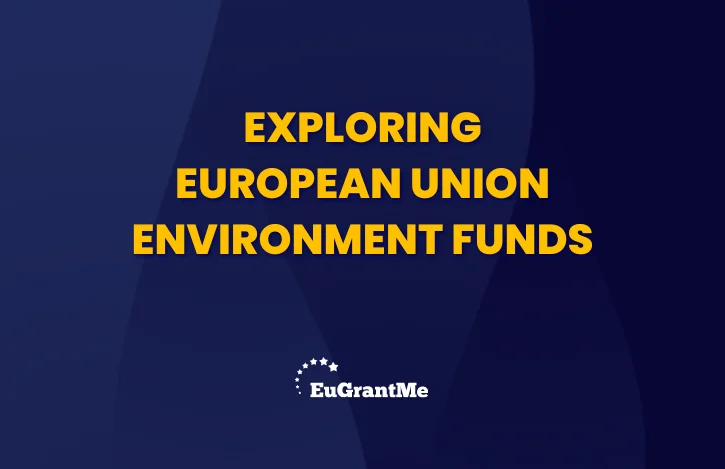Exploring European Union environment funds reveals a commitment to sustainability and environmental protection that is critical for the future of the continent. These funds are designed to support initiatives that aim to reduce environmental impact, promote renewable energy, and conserve natural resources. By understanding the scope and objectives of these funds, stakeholders can better leverage them to achieve their environmental goals.
LIFE Programme: A Pillar of EU Environmental Funding
The LIFE Programme stands out as one of the most significant European Union environment funds. Established in 1992, LIFE is the EU’s funding instrument for the environment and climate action. It supports projects that contribute to the implementation, updating, and development of EU environmental and climate policy and legislation. The LIFE Programme is divided into two sub-programmes: one for the environment and the other for climate action. The environmental sub-programme focuses on nature conservation and biodiversity, resource efficiency, and environmental governance and information. By funding innovative projects, LIFE plays a crucial role in driving sustainable development across Europe.
Horizon Europe: Research and Innovation for Sustainability
Horizon Europe, the EU’s key funding programme for research and innovation, also plays a pivotal role in supporting environmental initiatives. This programme funds projects that aim to tackle climate change, promote sustainable development, and protect natural ecosystems. Horizon Europe is designed to foster collaboration among European researchers, businesses, and policymakers to develop innovative solutions to environmental challenges. By integrating environmental priorities into its various research areas, Horizon Europe ensures that sustainability remains at the forefront of the EU’s research and innovation agenda.
Cohesion Fund: Supporting Environmental and Infrastructure Projects
The Cohesion Fund is another critical component of European Union environment funds. This fund is aimed at member states with a Gross National Income (GNI) per capita below 90% of the EU average. It supports projects in the fields of environment and trans-European networks in transport infrastructure. The primary goal of the Cohesion Fund is to reduce economic and social disparities and promote sustainable development. By financing projects that enhance environmental protection, improve infrastructure, and support sustainable transportation, the Cohesion Fund contributes significantly to the EU’s environmental and climate objectives.
European Regional Development Fund: Fostering Green Innovation
The European Regional Development Fund (ERDF) is designed to strengthen economic and social cohesion in the European Union by correcting imbalances between its regions. Part of this fund is allocated to promoting environmental sustainability and green innovation. The ERDF supports projects that aim to improve energy efficiency, promote renewable energy, and develop green technologies. By fostering innovation and sustainable development at the regional level, the ERDF helps to create a more environmentally resilient and sustainable Europe.
European Social Fund Plus: Integrating Environmental Priorities
The European Social Fund Plus (ESF+) focuses on improving employment opportunities, promoting social inclusion, and combating poverty. However, it also integrates environmental priorities into its funding strategy. ESF+ supports initiatives that promote green skills and jobs, contributing to the transition to a green economy. By aligning social and environmental objectives, ESF+ ensures that the shift towards sustainability is inclusive and benefits all sectors of society.
Connecting Europe Facility: Investing in Sustainable Infrastructure
The Connecting Europe Facility (CEF) is another vital EU funding programme that supports infrastructure projects. While its primary focus is on transport, energy, and digital networks, CEF also emphasises sustainability. It funds projects that aim to reduce greenhouse gas emissions, promote energy efficiency, and develop sustainable transport solutions. By investing in sustainable infrastructure, CEF contributes to the EU’s broader environmental and climate goals.
Just Transition Fund: Supporting Regions in Transition
The Just Transition Fund (JTF) is a new instrument created to support regions and workers who are most affected by the transition towards a low-carbon economy. It aims to alleviate the socio-economic impact of the transition by supporting economic diversification and reconversion in regions that heavily depend on fossil fuels or high-emission industries. The JTF funds projects that promote clean energy, reskilling of workers, and environmental rehabilitation. By focusing on a just and inclusive transition, the JTF ensures that no region or community is left behind in the shift towards sustainability.
Maximising the Impact of EU Environmental Funds
Briefly, exploring European Union environment funds reveals a comprehensive strategy aimed at promoting sustainability and environmental protection across the continent. From the LIFE Programme to Horizon Europe and the Just Transition Fund, these funding instruments support a wide range of initiatives that address environmental challenges and promote green innovation. By understanding and leveraging these funds, stakeholders can drive significant progress towards a more sustainable and resilient Europe. As the EU continues to prioritise environmental sustainability, the role of these funds will become increasingly vital in shaping the future of the continent.
At EuGrantMe, we are passionate about fostering innovation and empowering ambitious minds to flourish. Our mission revolves around providing top-notch grant writing services for the EIC Accelerator and Horizon grants in Europe, enabling our customers to unlock the full potential of their ground-breaking ideas.
Do you have a project to turn into reality?
Contact us!


